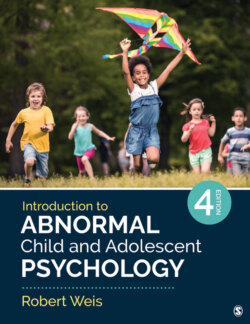Читать книгу Introduction to Abnormal Child and Adolescent Psychology - Robert Weis - Страница 57
На сайте Литреса книга снята с продажи.
What Professionals Help Children and Families? The Helping Professions
ОглавлениеChildren’s mental health problems are complex. As a result, their treatment often requires coordinated care from professionals with different educational backgrounds and training (Image 1.4). In this section, we will learn about the different types of professionals who provide these services. There are so many helping professions relevant to children and families, we cannot review all of them here. However, we’ll examine some of the major fields of study with the hope that it might motivate you to learn more about these fields on your own (Landrum & Davis, 2014; Metz, 2016; Norcross & Sayette, 2016).
Psychologists assess, diagnose, and treat individuals with mental disorders. They hold a doctoral degree (PhD or PsyD) in clinical or counseling psychology. Psychologists are not physicians; consequently, most do not prescribe medication but instead rely on psychotherapy and other nonmedicinal interventions. Child psychologists complete a 4- or 5-year graduate program and a 1-year internship accredited by the APA. Many also receive postdoctoral specialization in assessment, therapy, or neuropsychology. They work in hospitals, clinics, residential treatment facilities, private practice, and colleges/universities.
School psychologists assess, diagnose, and treat children with behavioral, cognitive, and social–emotional problems that interfere with their functioning at school. Most specialize in the identification and treatment of developmental and learning disabilities, deliver school-based mental health services, and act as liaisons between children’s families and the school. Most have a specialist degree in education (EdS) or a doctoral degree in education or psychology (EdD or PhD) and are accredited by the National Association of School Psychologists or the APA.
©iStockphoto.com/KatarzynaBialasiewicz
Psychiatrists are physicians (MD or DO) who specialize in the assessment, diagnosis, and treatment of mental disorders. They complete medical school and a 4-year residency in psychiatry and are certified by the American Board of Psychiatry and Neurology. Child psychiatrists specialize in mental disorders in children and adolescents. Most of their work involves prescribing psychotropic medications and monitoring children’s response to treatment.
Pediatricians are physicians (MD or DO) who treat children and adolescents with medical illnesses. They may also prescribe psychotropic medications to children with disorders such as ADHD, anxiety, and depression. They complete medical school and a 3-year pediatric residency and are certified by the American Board of Pediatrics. Developmental–behavioral pediatricians have specialization in evaluating and treating children with developmental disorders and behavior problems. They work in hospitals and clinics.
Psychiatric–mental health nurses are nurses who specialize in the treatment of individuals with mental disorders. Psychiatric–mental health nurse practitioners earn either a master’s or doctoral degree and, in many states, can practice independently. They tend to work in hospitals, clinics, and residential treatment facilities.
Licensed professional counselors (LPCs) are professionals who treat mental health problems in children, adolescents, adults, and families. Most LPCs have a master’s degree and have completed postgraduate supervised clinical work before practicing independently. LPCs often adopt a treatment approach that focuses on clients’ strengths and goals, rather than disorders and limitations. LPCs work in community mental health centers and private practice.
Marriage and family therapists are mental health professionals trained in couples and family systems therapy. They are licensed to diagnose and treat mental and emotional disorders within the context of a couple or family. Most have a master’s degree and work in outpatient clinics and private practice.
Social workers are professionals who provide counseling and support to individuals and families experiencing psychosocial stress. Most licensed social workers (LSWs) have a bachelor’s or master’s degree and provide case management services to children and families. Licensed clinical social workers (LCSWs) typically have a master’s degree and can also provide therapy. They work in hospitals, clinics, residential treatment facilities, social service agencies, and schools.
Speech–language pathologists assess, diagnose, and treat communication disorders in children, such as language delays, articulation problems, and stuttering. They may also help children who have language problems because of an injury, developmental disability, or autism. Most have a master’s degree and work in schools, clinics, and hospitals.
Occupational therapists treat sick, injured, or disabled children through the therapeutic use of everyday activities and exercises. They help children develop, recover, and improve the skills needed for play, education, and daily living. They typically have a master’s degree and work in schools, clinics, and hospitals.
Special education teachers help students with cognitive, emotional, and physical disabilities. They adapt lessons to meet the needs of these students. Some also teach basic communication and daily living skills to students with severe disabilities. They typically have a bachelor’s or master’s degree in education with a teaching license and work in schools.
School counselors help students develop academic and social skills to succeed in school. Career counselors also assist youths with the process of making career decisions by helping them develop skills or choose a career or educational program. Most have a master’s degree in school counseling and work in schools.
Child life experts are professionals who help children and families cope with psychosocial stressors through activities and play. They may help children separated from their families because of trauma or children hospitalized because of illness or injury. Most have a bachelor’s degree with a background in child development and family systems. They work in clinics, residential treatment facilities, and hospitals.
